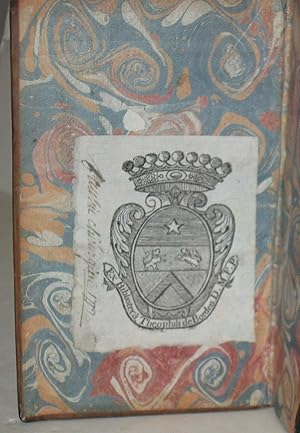Descripción
Frontispiece, 1 leaf [title page], viii, 343 pp. Contemporary full leather. Small chip at top of spine. Light stain on frontispiece, title page, and next few leaves. Very Good. First Edition. COPY OF THÉOPHILE DE BORDEU (1722-1776), with his bookplate ("Ex Bibliotheca Theophili de Bordeu D. M. F. P."). Later the copy of the surgeon Bauhin, with his signature, dated 1779. Mémoire I (October 8, 1754): "Exposé analytique des resultats tirés des experiences" with "Supplement . . . Observations sur la cause du movement du coeur" (November 10, 1751) (pp. 1-174). Mémoire II (March 26, 1756): "Exposé synthetique des faits, sur lesquels se fonde le Mémoire I" (pp. 175-342). Garrison-Morton 11607: "In these memoirs Haller described the results of 235 vivisections. Haller has been called 'the founder of modern haemodynamics.' 'The myogenic theory of the heartbeat can be traced to Haller, who concluded on the basis of animal experiments that the heart beat spontaneously, independent of nervous or other connections. He argued that the heart muscle had intrinsic irritability' (W. Bruce Fye)." "This ushered in the developments which were to lay the foundations of a new branch of physiology, haemodynamics. The last task in reaching this goal consisted in synthesising all existing findings and confirming and adding to them in further experiments. The final step was to preserve these results in a suitable literary form for posterity. The man--who was probably the only one who could have accomplished this gigantic work--was Albrecht von Haller, the greatest man of medicine of the eighteenth century" (Heinrich Buess, "William Harvey and the Foundation of Modern Haemodynamics by Albrecht von Haller," Medical History, Vol. 14, 1970, p. 179). "This work on the heart stamps Haller as a first-class investigator and experimental physiologist. His findings are based on animal experimentation and the experiments are carefully documented. The plate [frontispiece] showing human blood transfusion is particularly interesting." (Heirs of Hippocrates 885). About Théophile de Bordeu: This association copy of Bordeu with Haller is of special interest because they were on opposite sides of the vitalist (Bordeu)-mechanist (Haller) divide in 18th century medicine and physiology. Bordeu, like Haller, was concerned with blood. See Garrison-Morton 1117 for Bordeu's "Recherches sur les maladies chroniques. Vol. 1. Analyse médicinale du sang" (Paris: Ruault,1775): "De Bordeu first conceived the idea of internal secretion by his hypothesis that every organ, tissue, and cell discharges into the blood products which influence other parts of the body." A useful discussion of Bordeu's vitalism is Elizabeth L. Haigh, "Vitalism, the Soul, and Sensibility: The Physiology of Théophile Bordeu", Journal of the History of Medicine and Allied Sciences, Vol. 31, No. 1 (January 1976), pp. 30-41. N° de ref. del artículo 17217
Contactar al vendedor
Denunciar este artículo
Detalles bibliográficos
Título: Deux mémoires sur le mouvement du sang et ...
Editorial: Lausanne: Marc-Michel Bousquet, se vend à Paris, chez David, 1756.
Encuadernación: Hardcover
Condición: Very Good
Edición: 1st Edition
![]()




